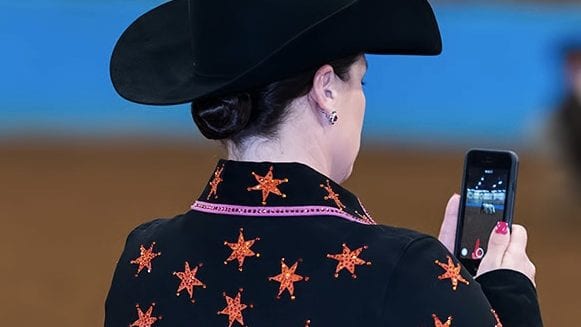In today’s world, where social media has taken center stage as the PA system of our lives, it is easy to ask the question, “If something happens and you don’t post it on social media, did it really happen?” Obviously, we all have lives outside of social media, but it often seems as though our presence online is becoming equally as important as our presence in person.
In the horse world, it is no different. With many more transactions and horse deals taking place on online, there is no doubt that social media has provided another platform through which to conduct business.
However, in addition to the many welcome conveniences of social media, it also comes along with its share of complications. We talked to some professional horse trainers to see how the increasing demand of social media has affected their business.
The Evolution of Social Media
 Before the rise of social media, sellers spent hours tirelessly taking video footage of their horses to make VHS tapes to send out to potential buyers. Before posting a video, many conversations would be held on the phone between both parties to determine if the horse would be a good fit for the buyer.
Before the rise of social media, sellers spent hours tirelessly taking video footage of their horses to make VHS tapes to send out to potential buyers. Before posting a video, many conversations would be held on the phone between both parties to determine if the horse would be a good fit for the buyer.
According to Dakota Griffith of DDG Performance Horses, a buyer had to be serious to get the seller to send a video. “Back in the old days, we would find out about horses in magazine ads or by word of mouth, and we would make an inquiry to the seller to get a VHS tape. By the time you received a video, you knew a lot about the horse and had a relationship with the seller.
Nowadays, simply post a video on social media and buyers are bombarded with footage of horses for sale,” says Griffith.
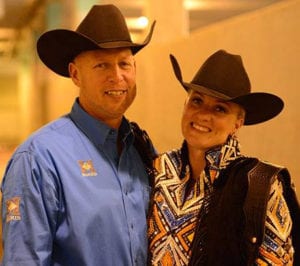 Katy Jo Zuidema of Zuidema Pleasure Horses echoes Griffith’s perspective of selling horses since social media has become a fixture in the horse industry. “When I was a kid, my dad [Wayne Davis] and Carl Yamber were the major horse traders, and they would get in the truck and drive for thousands of miles to find horses for us to train and sell. They would come back with horses that no one had ever heard of before, and we would ride them, fix them up, and many would go on to win at major events and bring big money when we sold them.
Katy Jo Zuidema of Zuidema Pleasure Horses echoes Griffith’s perspective of selling horses since social media has become a fixture in the horse industry. “When I was a kid, my dad [Wayne Davis] and Carl Yamber were the major horse traders, and they would get in the truck and drive for thousands of miles to find horses for us to train and sell. They would come back with horses that no one had ever heard of before, and we would ride them, fix them up, and many would go on to win at major events and bring big money when we sold them.
Zuidema continues, “Those days are over. With social media, Anybody can walk in their backyard and take a video of their horse loping across the pasture and put a clip on social media and have tons of people telling them how beautiful their horse is and wanting to buy them. Horses are marketed so differently these days. I cannot think of one time I have gotten on the road to look at a horse without knowing what I am going to look at,” she says.
Marketing and Selling Horses on Social Media
 Kellie Hinely (pictured middle) of Trendsetter Performance Horses appreciates the convenience that comes along with social media since she also remembers the days of overnighting DVDs and VHS tapes. “I am so grateful for the technology. I send videos all the time though Facebook Messenger, and I use YouTube to post videos regularly. We do a lot less advertising of our sale horses in print ads and use social media to spread the word that they are for sale which is a lot more cost-effective and efficient,” she says.
Kellie Hinely (pictured middle) of Trendsetter Performance Horses appreciates the convenience that comes along with social media since she also remembers the days of overnighting DVDs and VHS tapes. “I am so grateful for the technology. I send videos all the time though Facebook Messenger, and I use YouTube to post videos regularly. We do a lot less advertising of our sale horses in print ads and use social media to spread the word that they are for sale which is a lot more cost-effective and efficient,” she says.
Melissa Zanetti of Zanetti Performance Horses uses social media to market horses but has also noticed the phenomena of indirect marketing that can happen just by posting videos of daily activity at the barn on social media. “One day, I put one of my client’s children on a horse, and this great big horse was so great with this tiny little girl that it was too cute not to take a video to post on social media. Within minutes of posting the video, I received many positive responses and feedback. Many people wanted to know if the horse was for sale. The video was not intended to market the horse, but I could have sold him multiple times off that video,” she says.
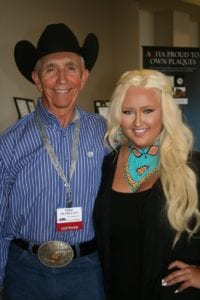 While the trainers we interviewed agree that social media helps them to reach a large group of potential horse buyers with the click of a button, it comes with its share of complications. “I think marketing horses on social media has in some ways been more of a curse than a blessing. There are a lot more tire kickers and people who will waste your time when they are not serious buyers. You will spend more time answering questions and jumping through hoops only to have a sale not go through. Also, social media is flooded with horses for sale. Go on any of these pages that promote horses for sale, and there are new posts every minute. It has become hard to stand out in the crowds and attract serious buyers,” says Griffith.
While the trainers we interviewed agree that social media helps them to reach a large group of potential horse buyers with the click of a button, it comes with its share of complications. “I think marketing horses on social media has in some ways been more of a curse than a blessing. There are a lot more tire kickers and people who will waste your time when they are not serious buyers. You will spend more time answering questions and jumping through hoops only to have a sale not go through. Also, social media is flooded with horses for sale. Go on any of these pages that promote horses for sale, and there are new posts every minute. It has become hard to stand out in the crowds and attract serious buyers,” says Griffith.
Hinely also points out that many videos online are ambiguous about the price of their horses and that can lead to unfair comparisons of horses. “When there are no prices on videos, people are comparing horses that are priced differently to each other and often, that can impact sales. I think it is important to post prices and make sure that all transactions are transparent to ensure that all sellers and buyers are well informed and are making proper comparisons,” she says.
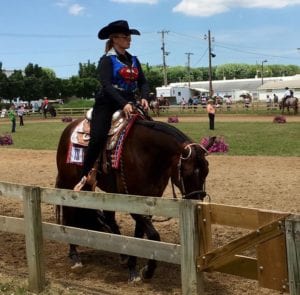 As a person who is a self-professed “hater of making videos,” Zuidema feels as though the demand for her to make videos to sell horses has increased drastically since the rise of social media. “People want more and more videos than ever before and of course I want to sell horses, so I have to make videos, but I feel like the access to technology, whether it be social media or smartphones, has made it so that people expect instant gratification. These days, if you don’t make a good video, you can’t sell your horse,” she says.
As a person who is a self-professed “hater of making videos,” Zuidema feels as though the demand for her to make videos to sell horses has increased drastically since the rise of social media. “People want more and more videos than ever before and of course I want to sell horses, so I have to make videos, but I feel like the access to technology, whether it be social media or smartphones, has made it so that people expect instant gratification. These days, if you don’t make a good video, you can’t sell your horse,” she says.
Zuidema also finds that it is harder to find horses to purchase as resale horses since the boom of social media. “In a profession where we rely on sales and commissions from sales to supplement our income, social media has made it harder for us to find good horses for competitive prices,” she explains.
However, with thousands of friends and followers, all of our experts agree that social media has allowed them instant access to many potential buyers with the click of a button and that convenience has its perks.
Other Positive Aspects of Social Media
All of the trainers we talked to agreed that social media has its perks. Zanetti had a unique experience that showed her the power of social media when a video of her showing bridleless in trail went viral. “It was a total spur of the moment thing. We were just doing a fun trail event, and there were maybe 20 spectators total at the show during my ride,” she recalls.
Little did she know that her video (pictured below) would end up with over 250,000 views, comments from eight different countries, and a slew of positive feedback from her peers and others from outside of her usual network. “Before social media, something like this would have just been a fun time at a horse show. Since social media was involved, I got so much recognition, including people wanting to join my program and it also sparked people’s interest in trail who were not even involved directly in our industry,” she says.
Social media is also a great place to share news about clients and training programs. “I use it to brag about my clients and their accomplishments. We used to run more print ads but there is a delay in gratification. But, with sites like Facebook and GoHorseShow you can gain quick feedback. My customers love to see the positive feedback for their accomplishments,” says Griffith.
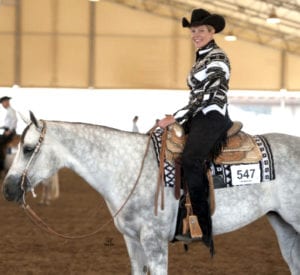 Hinely agrees that posting results and achievements on social media can be very beneficial and fun for her clients. However, she rarely has time to post all of the results and in turn, has even considered hiring someone to manage her page when she is at shows. “I don’t want to leave anyone out, and when we are showing so many horses, and we have long days and nights, I worry that I will leave a client out unintentionally,” she says.
Hinely agrees that posting results and achievements on social media can be very beneficial and fun for her clients. However, she rarely has time to post all of the results and in turn, has even considered hiring someone to manage her page when she is at shows. “I don’t want to leave anyone out, and when we are showing so many horses, and we have long days and nights, I worry that I will leave a client out unintentionally,” she says.
Social media has also eliminated the need to maintain a website since many of the same features can be done on social media, and it’s free. “We used to have a website that we updated every week, and the site has not been updated since we started using our Facebook business page. We used to have to check in with our site coordinator, and she would change things. Now, we can post things ourselves and we can even go on Facebook Live from a show if there is a momentous occasion that we want to share in real time,” says Griffith.
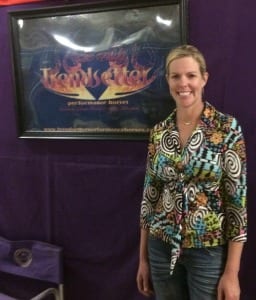 Hinely also keeps her website going but finds the feedback received on social media to be more beneficial. “I do not know how often my site is visited and of course there is not direct feedback on my site. I like that I can interact with people directly through social media,” she says.
Hinely also keeps her website going but finds the feedback received on social media to be more beneficial. “I do not know how often my site is visited and of course there is not direct feedback on my site. I like that I can interact with people directly through social media,” she says.
Another positive aspect of social media is keeping up with friends and knowing about their lives outside of the horse shows. “I think social media helps to remind us of people’s birthdays, graduations, and other significant life events. It helps us to be more than people we see at the barn or a horse show, we become more aware of people’s lives outside of the horses,” says Zanetti.
All of our experts agree that social media has made the horse world even smaller. It has become easier to find out results of horse shows and also help to plan a show schedule based on information posted on social media.
Some Drawbacks of Social Media
 We all know the story of the Wizard of Oz. The Emerald City lived in fear of the Great Wizard, who turned out to be a tiny scared man hiding behind a curtain using his megaphone to project his menacing booming voice to make all who stood in front of him cower in his presence. Social media can be a similar ruse. “A lot of people are brave behind a computer screen because they don’t have to have accountability and they start unnecessary drama. They get directly involved in the thick of the horse business and say things that they would never say if communication were face-to-face,” says Griffith.
We all know the story of the Wizard of Oz. The Emerald City lived in fear of the Great Wizard, who turned out to be a tiny scared man hiding behind a curtain using his megaphone to project his menacing booming voice to make all who stood in front of him cower in his presence. Social media can be a similar ruse. “A lot of people are brave behind a computer screen because they don’t have to have accountability and they start unnecessary drama. They get directly involved in the thick of the horse business and say things that they would never say if communication were face-to-face,” says Griffith.
Zuidema has noticed many videos (particularly of western pleasure horses) being attacked by people on social media. “Some of the negative attention on social media makes our entire industry look bad. Many people are basing their opinions on a whole industry off one video they happen to see on social media, and I think it discourages outsiders from wanting to get involved.”
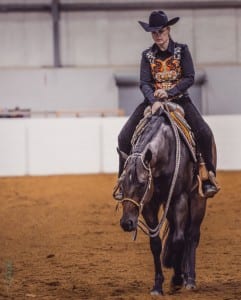 Social media is notorious for uniting people behind a cause, generally a positive thing. Many times it can complicate matters further and can turn into massive wars with few solutions. “Social media gives people a platform through which to voice concerns and try to discuss issues and hopefully find answers, however, for the most part, my experience is that people want to complain and have strong opinions, but few have constructive solutions for the problems,” says Zuidema.
Social media is notorious for uniting people behind a cause, generally a positive thing. Many times it can complicate matters further and can turn into massive wars with few solutions. “Social media gives people a platform through which to voice concerns and try to discuss issues and hopefully find answers, however, for the most part, my experience is that people want to complain and have strong opinions, but few have constructive solutions for the problems,” says Zuidema.
Additionally, Griffith and Zuidema both agreed that there could be additional problems when the mode of communication is written. “When words are written, it is easy to misunderstand the intention of the message. There are no inflections in the voice or direct feedback like there is in face-to-face communication, and therefore, the message is open to the reader’s interpretation, which can often cause problems,” says Griffith.
Although every barn has its unique set of dynamics, social media can further complicate these dynamics in many situations. “I have had situations where friendships were threatened, and part of that was due to the dynamics of social media,” says Zanetti.
Social media provides a platform for people to be impulsive. Posters get caught up in the heat of the moment and post things they might not have put out there in times past. Griffith points out that her clients’ posts directly reflect on her business and she encourages them to think about that before they post to social media. “It is important to think about who you are reaching and if/how it will affect those around you before you post,” she says.
 Hinely adds, “If it is not something you would be okay with mom and dad seeing, you probably shouldn’t post it on social media.”
Hinely adds, “If it is not something you would be okay with mom and dad seeing, you probably shouldn’t post it on social media.”
We live in a society of instant gratification. People have begun to expect immediate responses to messages on social media, putting added pressure on horse trainers. “I have learned not to ride with my phone. When I am riding, I have to be focused, and if I have to keep stopping, it destroys the flow of my ride,” says Zuidema.
Griffith also believes that social media can be disruptive and get in the way of the most important job, which is training horses. “Horse trainers spend a lot of time on Facebook when they should be out in the barn. We need to devote more time with the horses and less time being fully connected. As a rule, I leave my phone in the barn when I ride so that I can be fully present when I am riding. Champions are made in the arena, not on social media,” she says.
Without a doubt, social media is here to stay. And although the positives of social media far outweigh the negatives, all of our trainers agree that we should use these outlets to build each other up rather than tearing each other down. In a world where everyone can be a critic, it is important to remember that we have to stick together to keep the horse industry alive and thriving. Focus on the positives, enlist the help of experts if need be, and maximize your social media to improve your program and, thus, the horse show industry as a whole.
Stay tuned for Part 2 of 3 articles in our social media series where we talk to some social media experts about the best practices to successfully market horses and businesses on social media.
Photos © Cody Parmenter, NSBA, GoHorseShow, Tiffany Anne Photo


